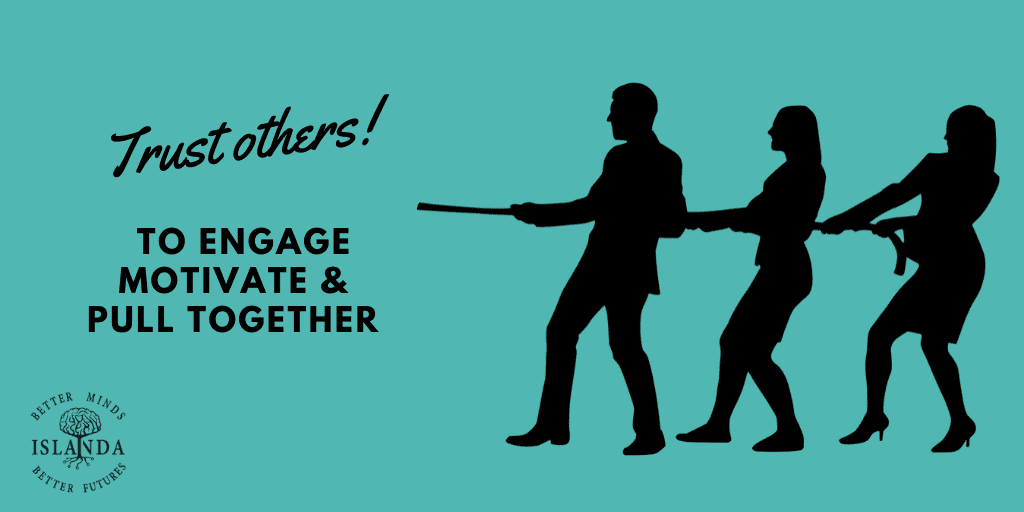“The best way to find out if you can trust someone is to trust them.” Ernest Hemingway
Trust is a vital ingredient for all relationships – professional and personal. Without it we find it hard to connect, collaborate and be open to other perspectives.
Trust helps us feel psychologically safe so we can engage fully, share openly and be creative. Conversely, distrust prompts us to focus our attention on potential threats and protecting ourselves from those threats. In a state of distrust, our attention is more on ourselves than any creative task or idea at hand, diminishing our effort, creativity and productivity.
Furthermore, trust breeds more trust, such that if you trust someone they are more likely to be trustworthy and do the right thing. Paul Zak, Neuroscientist, provides insights from his research on oxytocin showing that “When you show trust in someone, oxytocin surges through their brain and triggers a reciprocal act.” His book Trust Factor provides examples of how to build high-trust organisations by embedding a culture and processes that consciously stimulate oxytocin. Examples include celebrating effort, sharing information, promoting ownership, investing in employee growth and other proven strategies.
Trust can take a long time to establish and moments to destroy
For new relationships it is completely understandable, for both parties, that trust may not be present. We accept that trust needs to be built through understanding each other – our personal styles, motivations and whether we are aligned.
However, when you have known someone for a while and the situation or environment changes, should your level of trust waver?
The logical answer would probably be no, especially if you have worked with, or known, the person for a while and they have always been trustworthy.
However, from our brain’s perspective, when we are faced with something unfamiliar this can trigger our threat response. We don’t know what threats exist and we haven’t developed strategies to manage them. In such instances we may act (and this could be interpreted) as if we don’t trust the person. In fact, it is the unfamiliar situation we are uncomfortable with, not the person.
Any interpretation of distrust could have a number of negative consequences:
- The person may feel that his integrity has been questioned leading to feeling hurt, devalued and misunderstood
- Attention is focussed on the source of distrust rather than the task in hand impacting productivity and creativity
- Both parties will feel less able to connect, collaborate and be open to each other’s ideas
- The relationship itself could be damaged with a possible permanent erosion of trust
In current times we had to swiftly shift to working from home with little time to plan or agree best practise. This unfamiliar situation could be a trigger for many leaders of people, prompting thoughts like:
For employees:
- Are they actually working?
- Are they being productive and efficient?
- Are they doing it the right way?
For students:
- Are they paying attention to the lesson or are they looking at their phone?
- Are they answering authentically or are they reading the answers?
- Are they working independently?
As a leader your responses have an enormous impact on the people you lead and may have unintended consequences.
If you notice feelings of unease or distrust, take a moment and PAUSE to reflect on what could be creating this feeling and consider how you respond. In particular:
- Be open about your feelings and explore ways that you can work together to manage these feelings
- Discuss possible limitations and challenges and strategies to overcome them
- Agree expectations – what needs to be delivered and when
- Agree any ground rules
- Communicate openly and honestly on a regular basis
- Question your own thinking and response patterns What evidence do you have? How did you feel in the past? What else could be going on? Are you projecting your own fears?
Studies have shown that working from home increases efficiency and productivity. In addition, with more time, people are more likely to improve their work life balance and focus on their health and wellbeing enabling them to perform even better.
Trust can take a long time to establish and moments to destroy. Trust empowers, motivates and improves relationship bonds enabling better collaboration, co-creation and overall performance. Without trust, people are motivated by fear. In fear cultures, obedience may be achieved but optimum performance and full engagement is unlikely.
